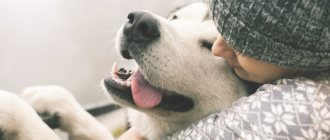The howling of a dog - your own or one living next door - is not only disturbing because it sounds loud and sad. It causes anxiety, even fear, in most people. These feelings are an echo of ancient instincts, when a howl indicating the presence of a wild animal forced a person to seek shelter or run away. And when such a sound comes from a long-tamed, domestic creature, heard in a home or near it, it causes, at best, significant discomfort.
Therefore, many speculations and signs arose explaining why a dog howls at night or during the day. They appeared at a time when people did not even try to understand the reasons for dog behavior. Let's try to find out whether all such assumptions can be considered fiction and what makes a domesticated animal howl.
Mysticism and facts
Almost all signs indicate that a dog's howling is a harbinger of death, trouble or serious problems. Most of the interpretations have been invented for why a dog howls in the yard at night, and almost all of them talk about the imminent death of the owner or family members. Such an eerie judgment, again, is due to man’s age-old fear of wolves. There are quite a few reasons for a dog’s howling, and in order to stop it, it doesn’t hurt to first figure it out, and not scold and punish the dog, or even worse, expect some kind of trouble.
Such vocal performance is a completely natural manifestation for dogs. This becomes clear if we recall their classification, according to which the canine family belongs to the order of carnivores, the genus and species of wolves. Drawing an analogy with wild relatives, one can find explanations for the howl of dogs, which among wolves has many variations and, above all, is a means of communication for them. Such a study will help you figure out why your dog howls during the day or at night and what to do about this annoying phenomenon.
How to wean it off?
At night
Reasons why a dog may howl at night:
- The reason for howling at night may be longing for the owner, especially if he is not at home.
- Some dogs may howl at the moon from insomnia, as they are somewhat dependent on lunar cycles, and become anxious and restless during full moons.
- Another reason for howling at night may be illness, although sick animals often whine rather than howl.
How to wean:
- First of all, you need to show the dog to a doctor to rule out the presence of any diseases. The veterinarian can also give more specific advice regarding howling at night.
- If your dog is left alone in the house at night, you can leave the radio and night light .
- Also a good solution (or if the dog is howling in the yard on a chain) would be to leave the dog something with your scent so that the animal feels safe and not alone and, of course, place its personal favorite toys .
In the yard or enclosure
Reasons for howling in the yard:
- Sociable dogs may miss their owners in the house and howl to attract their attention.
- Yard dogs often sense a bitch in heat and howl, unable to escape from the enclosure or from the chain.
- It is believed that dogs in an enclosure can howl (especially at night under the moon) from lack of freedom.
Comfortable enclosures for dogs: do it yourself without waste or mistakes
How to stop howling in an enclosure:
- If a dog attracts attention by howling, you should first scold the animal a little for singing. At the same time, you need to show the dog that his concerts will lead to nothing - reward the dog for silence, ignore the howling. The “Anti-bark” collar has a good educational effect, which, upon command from the remote control, splashes a stream of water in the dog’s face. This discourages the animal for a while.
- Ask yourself and answer honestly, are you giving your dog the attention and warmth it deserves? Even (or rather especially) with a dog living in an enclosure, you need to actively play in order to let it splash out its energy, feel needed and important, and prevent howling from idleness.
Like a wolf to the moon
Why do dogs and wolves howl at the moon:
The psychology of dogs is quite subtle. The full moon awakens ancient instincts in dogs, when their distant genetic ancestors, wolves, hunted in the light of the full moon and howled, inviting their pack. That is why during the full moon they are often restless, cannot sleep and howl at the moon.
In fact, there is no direct connection between the howl of a wolf and the moon. It just turns out that most sounds come on moonlit nights: because hunting is better on them and wolves are, in principle, nocturnal animals and are more active in the dark. To make it easier for fellow tribesmen to understand where the sound is coming from, the animal’s muzzle is raised when it howls: therefore, it seems as if it is howling at the moon.
Trying very hard











